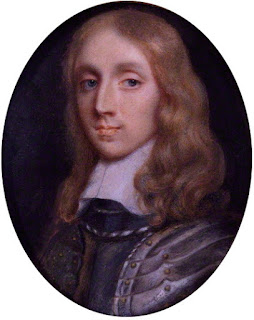Many people mistakenly think that "the North" won that war. The truth is, however, that the Union won that war and it was an entity which did not really exist prior to the conflict. The beliefs an goals of the victors, in 1865, were not the same as those of the men who began fighting for the North in 1861. A new nation, with a new interpretation of its founding documents, had been born from the strife and the destruction of war.
A similar transformation happened due to the English Civil War. When the victors, through their legislative tool known as the Rump Parliament, could not govern England, Wales, Ireland and Scotland, power was put into the hands of a Lord Protector.
This result only came about because Oliver Cromwell marched into the ineffective assembly of the Rump Parliament in 1653 and dissolved it. Afterward, he ordered the Congregationalist churches to send representatives to form a new governing body that became known as the Assembly of Saints. When this body also failed to manage the affairs of government for the sprawling Commonwealth. it too was dissolved. In December of 1653, a new constitution was proposed as was the radical idea of making Oliver Cromwell Lord Protector for life. As he was head of the most powerful military body in the land, this nomination was easy for him to confirm.
The Protectorate Under Oliver Cromwell
The form of government varied in appearance during the reign of Oliver Cromwell. However, the fact of his rule never really changed. There were parliaments called and bodies of major generals consulted but Cromwell always had his way. He dissolved the parliaments and ignored the generals when it suited him.
Nevertheless, Cromwell maintained order and defended the nation's borders during his rule. In fact, he even added to the nation's colonies with an invasion of Jamaica, which was a Spanish colony at the time.
The English elite were so impressed with Cromwell that they offered him the crown in 1657. Now things had come full circle in deed as well as in appearance. Cromwell, who had fought against the idea of monarchy, actually refused the offer. He stated that he "would not build Jericho again." However, his rule was stronger than that of almost any king in the world at that time.
Notwithstanding this protest, Cromwell was reinstated as Lord Protector in a regal ceremony. He was not granted the right of primogeniture but was offered the option of naming his successor. He died the following year.
The Protectorate Under Richard Cromwell
After Oliver Cromwell's death, primogeniture or not, his third son succeeded him as Lord Protector. The brief reign of Richard Cromwell exposed the weaknesses in the Protectorate, which had relied primarily on the strength of the army, rather than the consent of the governed, to maintain itself.
Richard tried to expand the power base to the people of the Protectorate and summoned a parliament to do that in 1659. He was immediately disappointed when Republican members derided the Protectorate as tyrannical and responsible for the economic depression in the country. In the Spring of that year, ignoring Richard without actually deposing him, the assembly created a new governing body which would eventually invite Charles II to return and rule over the Commonwealth in 1660.
Richard Cromwell himself never faced any punishment. He was simply forgotten as the nation moved forward under a new monarchy. He died at the age of 85 in Hertfordshire, England.


